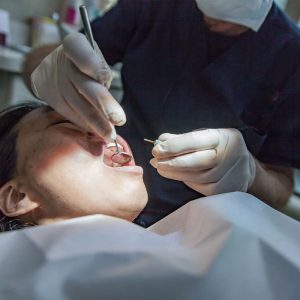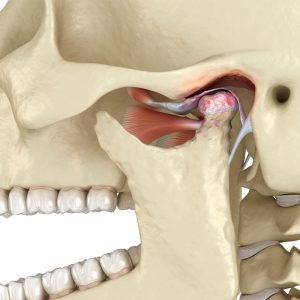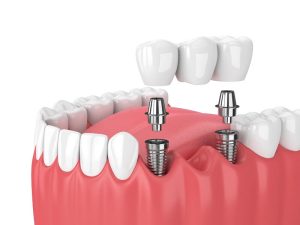
Tooth sensitivity is caused by your enamel (outer layer of the tooth) wearing down and exposing the dentin in your teeth. With reduced protection from your enamel, your tooth has increased sensitivity to temperature and touch. You can develop sensitive teeth for a variety of reasons, and the dentists at AZ Family Dental can help you find the cause – and solution. Visit our practices in the greater Phoenix, AZ area for the treatment needed to improve your sensitivity and advice on managing your symptoms.
Sensitive Teeth Treatment at AZ Family Dental
In some situations, sensitive teeth indicate an issue with the teeth or gums. You can discover the cause of your symptoms by visiting the dentists at our office. Your greater Phoenix area dentist will perform a basic examination to see if you have an underlying condition creating the sensitivity. They may suggest one of the following treatments:
- Fluoride: Our dentist might apply fluoride to your teeth or prescribe a fluoride kit for use at home. Fluoride strengthens your enamel to protect the dentin inside your teeth.
- Bonding, crowns, or inlays: Crowns, bonding, and inlays involve the use of an implant or resin that adds a physical barrier to your dentin. The new layer shields exposed roots in your teeth.
- Root canal: When tooth sensitivity comes from an infection in the pulp inside your tooth, you may need a root canal. During this procedure, our dentist removes the infection to relieve your symptoms.
Once our dentist finishes your sensitive teeth procedure, they will advise you on ways to reduce your symptoms. Patients with sensitive teeth can protect their smiles by practicing good oral hygiene and avoiding acidic foods. Our dentist may also recommend a mouth guard if you have tooth sensitivity that comes from grinding.
In future appointments, our dentist will use approaches that make routine dental care more comfortable. During regular procedures such as cleanings, the dentist will apply a paste to your teeth that reduces sensitivity. This paste allows our dentist and hygienists to keep your teeth healthy without exacerbating your discomfort.
At-Home Treatment Strategies
Depending on the nature of your teeth sensitivity, one of the dentists at AZ Family Dental may suggest at-home remedies, such as avoiding exposing your tooth to hot, cold, or crunchy food. We can prescribe a toothpaste called Fluoridex for sensitive teeth or ask you to get an over-the-counter option. The dentists at AZ Family Dental will look for the source of your sensitivity to determine if you need further treatment.
Educational Video:
Frequently Asked Questions for Sensitive Teeth Pain
Typically, sensitive teeth are due to worn tooth enamel or exposed tooth roots. These issues arise for several reasons, including:
– Brushing your teeth too hard
– Over whitening your teeth
– Cavities or tooth decay
– Teeth grinding (bruxism)
– Too much acidic foods or acidic mouthwash
– Loose fillings
– Periodontal disease (gum disease)
– Recent dental procedures
– Using certain medications (aspirin, antihistamines, antibiotics)
– Acid reflux (GERD)
Not all sensitive teeth require dental procedures. Our dentist may recommend at-home treatments to help with tooth sensitivity and pain, like desensitizing toothpaste or using a mouthguard. More extensive treatments may be required if the discomfort persists or is due to a condition.
Surgical Gum Graft
Loss of gum tissue can cause pain and require a gum graft. This process involves abstracting a small amount of gum tissue from somewhere else and attaching it to the area to cover exposed roots.
Dental Bonding
Dental bonding approaches exposed root repair similarly to a gum graft. Rather than taking tissue from another area of the mouth, bonding resin is applied to the exposed root as a protection layer.
Fluoride Varnish Application
A fluoride varnish application can strengthen the tooth’s enamel and reduce sensitivity and pain. This is normally done in-office, but our dentist can prescribe you at-home fluoride for ongoing treatment.
Tooth Filling
A filling deliberately removes the part of the tooth causing discomfort. Our dentist will clean the area with a gel and use a filling material on the removed portion, and following this, use adhesives and composite material to protect and seal it.
Root Canal
A root canal may be necessary in more severe cases to relieve tooth pain and sensitivity. The process includes the removal of the infected pulp and nerve in the tooth root, cleaning the canals located inside, filling and sealing the space, and placing a crown on the tooth for added protection.
Yes, but that doesn’t mean it always will. Most temporary tooth discomfort is due to a recent dental procedure where post-pain is expected. Schedule an appointment with our dentist for teeth sensitivity that lasts longer than it should or without a known cause. Different treatment measures, such as dental bonding or fluoride application, can reduce or completely diminish ongoing tooth pain and sensitivity.
Yes, a sensitive tooth nerve can heal itself and generally will in the case of post-procedure discomfort. This is because the tooth is naturally healing, and our dentists incorporate protection measures to quicken the process. When a cavity or injury is causing discomfort, the nerve itself may die and halt the pain. A dead nerve has indicators such as a high sensitivity to cold or hot foods and drinks. While a tooth with a dead nerve may fall out on its own, our dentist can include recommendations such as extracting your infected tooth before it spreads to other parts of your jaw.
If you’ve just had a dental procedure, you should expect sensitivity for around 2 to 4 weeks. If the discomfort persists for longer, contact our dentist to identify any existing problems, such as an infection.
Our Dental Office Locations
Same and Next Day New Patient Appointments Available!
Glendale
8519 N 59th Ave, Glendale, AZ 85302, United States
Cave Creek
28255 N Tatum Blvd Suite 4, Cave Creek, AZ 85331, United States
Phoenix
1820 W Thunderbird Rd suite 1, Phoenix, AZ 85023, United States













